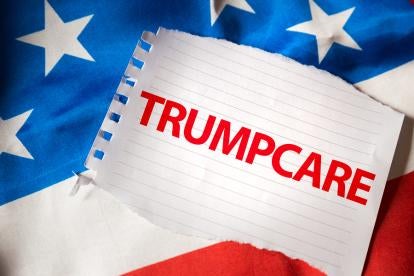As reported in our January 23, 2017 post entitled “Status of the Affordable Care Act Repeal Efforts,”1 one of the first priorities of the Trump administration was the repeal of the Patient Protection and Affordable Care Act (“ACA”). In our March 21, 2017 post entitled “The American Health Care Act – A Side-by-Side Comparison to Existing Law,”2 we reported that the House Committees on Ways and Means and Energy and Commerce proposed the American Health Care Act (“AHCA”) to “repair and replace” the ACA pursuant to the budget-resolution process on March 6, 2017 and that the Budget Committee voted to approve the AHCA on March 16, 2017. The AHCA was introduced and ordered reported by Committee on March 20, 2017.3
On March 22, 2017, the Rules Committee proposed amendments to the AHCA with the hope of gaining support from members of the House Freedom Caucus, a bloc of conservative Republicans.4 The proposed changes to the initial draft of the AHCA included:
-
eliminating the requirement imposed by the ACA that health plans offer “essential health benefits;”
-
limiting the ACA’s expansion of Medicaid to individuals who have income up to 133 percent of the Federal poverty level to States that adopted the expansion as of March 1, 2017 and sunsetting the enhanced Medicaid coverage as of December 31, 2017, one year earlier than the date proposed in the initial draft of the AHCA;
-
allowing States to impose a work requirement as a condition to Medicaid coverage for nondisabled, nonelderly and nonpregnant adults; and
-
accelerating the phasing out of various taxes imposed by the ACA.5
On March 24, 2017, the Rules Committee approved the AHCA, including the Manager’s amendments set forth above, and referred the AHCA to the House floor.6 The House of Representatives postponed consideration of the AHCA before the vote.7
There are conflicting reports on the status of health care reform ranging from claims that Republicans have ceased efforts to repeal the ACA and shifted their focus to tax reform to President Trump’s statement on March 28, 2017 that a deal on health care will happen “very quickly.”8 Extreme measures have been proposed, including repealing the ACA in its entirety without seeking a replacement. More moderate options also have been proposed, and there are seventy pending bills that already have been proposed in the current Congressional session. Others have suggested that a bipartisan measure ultimately may have the best chance of becoming law.
As of this writing, the ACA remains “the law of the land,” in the words of Speaker of the House, Paul Ryan (R-WI). Nevertheless, as reported in our January 23, 2017 Clients & Friends Memorandum, the Executive Order issued by President Trump within hours of taking office on January 20, 2017 authorizes the Secretary of the Department of Health and Human Services and the heads of other Federal agencies “to waive, defer, grant exemptions from, or delay the implement of any provision or requirement of the [ACA] Act that would impose a fiscal burden on any State or a cost, fee, tax penalty, or regulatory burden on individuals, families, health care providers, health insurers, patients, recipients of healthcare services, purchasers of health insurance, or makers of medical devices, products, or medications.”9 Accordingly, executive rulemaking or policy guidance may impact enforcement of the ACA. For example, even though the individual mandate implemented by the ACA is still required by law and the Internal Revenue Service (“IRS”) has stated that “taxpayers remain required to follow the law and pay what they may owe,” the IRS also published a change in policy overturning the previous system of rejecting tax returns that fail to disclose whether a taxpayer had health insurance coverage based on the January 20, 2017 Executive Order.10 At this time, interested parties should comply with all otherwise applicable provisions of the ACA unless there is legal authority for non-compliance.
1 http://www.cadwalader.com/resources/clients-friends-memos/status-of-the-affordable-care-act-repeal-efforts.
2 http://www.cadwalader.com/resources/clients-friends-memos/the-american-health-care-act--a-side-by-side-comparison-to-existing-law.
3 https://www.gpo.gov/fdsys/pkg/BILLS-115hr1628rh/pdf/BILLS-115hr1628rh.pdf.
4 See generally https://rules.house.gov/bill/115/hr-1628.
5 https://rules.house.gov/sites/republicans.rules.house.gov/files/115/115-AHCA-SxS-MNGR-Policy.pdf; https://rules.house.gov/sites/republicans.rules.house.gov/files/115/115-AHCA-SxS-Policy2ndDegree.pdf.
6 https://rules.house.gov/video/rules-committee-hearing-hr-1628-Friday; https://www.gpo.gov/fdsys/pkg/CRPT-115hrpt58/pdf/CRPT-115hrpt58.pdf.
7 https://www.congress.gov/bill/115th-congress/house-bill/1628.
8 Katie Rogers, How the Health Care Vote Fell Apart, Step by Step, N.Y. Times, Mar. 24, 2017, https://www.nytimes.com/2017/03/24/us/politics/guide-to-how-the-health-care-vote-fell-apart.html?action=click& contentCollection=Politics&module=RelatedCoverage®ion=Marginalia&pgtype=article; Alex Ruoff, GOP Sours on Obamacare Repeal; Next Attempt Unlikely Before 2019, Bloomberg BNA, Mar. 28, 2017, http://news.bna.com/dtln/DTLNWB/split_display.adp?fedfid=108092934&vname=dtrnot&jd=a0m1f5k7k7&split=0; Ayesha Rascoe, Trump Tells Lawmakers He Expects Deal ‘Very Quickly’ on Healthcare, Reuters, Mar. 28, 2017, http://www.reuters.com/article/us-usa-trump-obamacare-idUSKBN16Z34Z.
9 https://www.whitehouse.gov/the-press-office/2017/01/2/executive-order-minimizing-economic-burden-patient-protection-and.
10 https://www.irs.gov/affordable-care-act/individuals-and-families/individual-shared-responsibility-provision.



 />i
/>i

